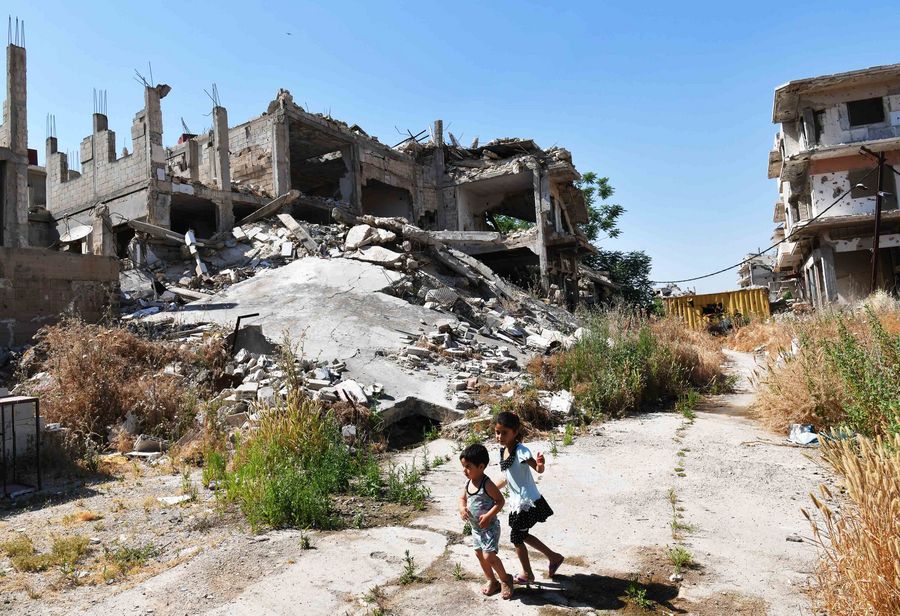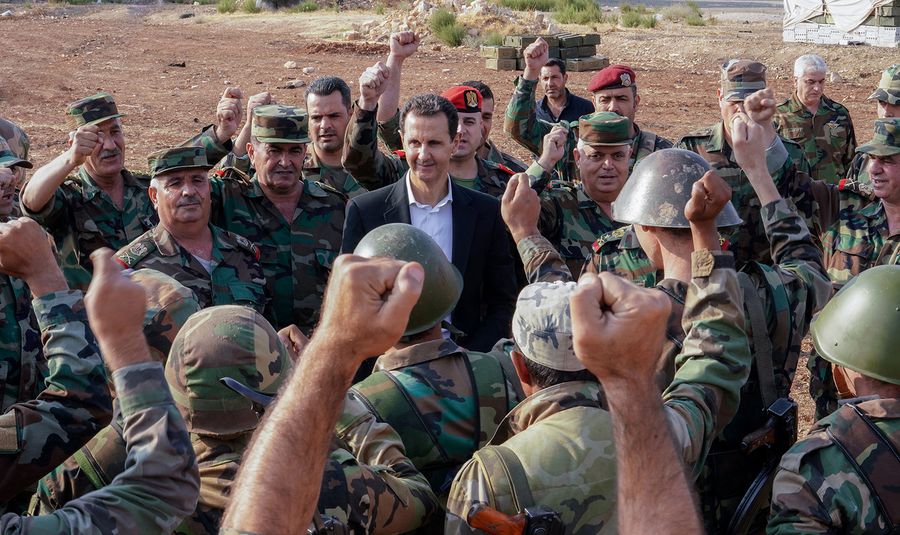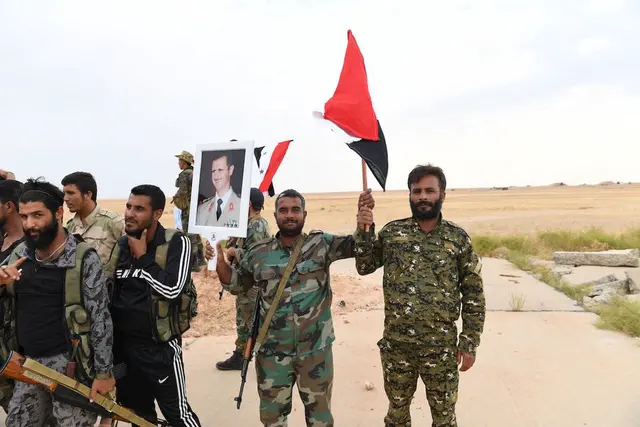Syrian soldiers are seen inside the Tabqa airbase in the Tabqa city of Raqqa province in northern Syria on Oct. 16, 2019. (Xinhua/Str)
As Syria has entered 2020 still being plauged by proxy war, economic suffering and sluggish political talks, will the protracted crisis since 2011 continue the painful alternation between hope and dismay in the new year? Let's have a look at what happened in 2019 and what may lie ahead in 2020.
DAMASCUS, Jan. 12 (Xinhua) -- Since the Syrian war broke out in 2011, the prospect of an end to the prolonged crisis has been alternating between hope and disappointment with new developments emerging every year, especially in the year 2019 that has witnessed sophisticated changes in the conflict-torn Middle East country.
PROXY RATHER THAN CIVIL WAR
In a positive sign of regaining the control of the entire country, the Syrian army in 2019 was able to consolidate the government's grip on key areas across the country including the capital Damascus.
However, the Syrian crisis is more like a proxy war than a civil one between the government and rebels, as it has become apparent that many foreign forces stationed on the Syrian soil are not ready to pull back without achieving their own gains.
The most prominent development on the ground in 2019 was the Turkish military campaign launched in October to expel the Kurdish forces in northern Syria.
The military buildup and operation prompted new understandings between Russia, which supports the Syrian government, and Turkey, which backs the rebels and antagonizes the Kurdish forces.
The new deals allowed the Turkish army and its allied rebels to storm areas controlled by the Kurdish-led Syrian Democratic Forces (SDF), pushing the SDF to reach understandings with the Syrian army under the Russian mediation.
With the understandings with SDF, the Syrian government forces entered areas along the Syrian-Turkish border to strip Ankara of the pretext to continue its assault against the SDF and other Kurdish militias.
Also in 2019, the Syrian army renewed the operation against the ultra-radical rebels in the northwestern province of Idlib, the last major rebel stronghold in the country.
Syrian President Bashar al-Assad recently highlighted the anti-terror war in Idlib as a priority of the Syrian government, which analysts said could be the title of the military operation in 2020.
In addition, after the Turkish decision to deploy troops upon the invitation of Libya's UN-backed Government of National Accord (GNA), about 2,000 Turkey-backed rebels in Idlib are being sent to the North African country to support GNA in its fight against the east-based army led by Khalifa Haftar.
A third thorny issue is the presence of the U.S. forces near the oil and gas fields in northeastern Syria as Washington has claimed the control of these energy fields.

Children of Kamal Shtaiwi play near their house in the Wadi al-Sayeh street in the central city of Homs, Syria, May 29, 2019. Kamal Shtaiwi, 58, enjoys returning to his home with his wife and four children, even though it is surrounded by the destruction of war. (Xinhua/Ammar Safarjalani)
ECONOMIC SUFFERING
With the devaluation of the Syrian pound and the lack of heating fuel and cooking gas, it seems that this economic suffering will last through an entire year of 2020.
In December of 2019, U.S. President Donald Trump signed a Syria sanctions bill as a part of the National Defense Authorization Act for Fiscal Year 2020.
The bill, formally known as the Caesar Syria Civilian Protection Act, authorizes additional sanctions and financial restrictions on institutions and individuals doing business with the Syrian government.
The U.S. sanctions are pulling the already suffocating Syrian economy deeper into an abyss of woes, particularly amid the devaluation of the Syrian pound which is now sold in the black market at 940 pounds for one U.S. dollar, losing more than 50 percent of its value compared to the beginning of 2019.
Maher Ihsan, a Syrian journalist and political expert, told Xinhua that 2020 will be the year of an economic war after eight years of ground battles in Syria.
"The year 2020 will not be easy in terms of the livelihoods of the Syrians, particularly as the neighboring countries of Syria such as Lebanon and Iraq are also facing troubles," he said.
The turmoil in neighboring Lebanon has been a key factor behind the steep devaluation of the Syrian pound as most Syrian businessmen have bank accounts in Lebanon during the war, the Syrian expert explained.

Syrian President Bashar al-Assad (C) visits a military base in the town of Habit in the countryside of Idlib province, Syria, on Oct. 22, 2019. (Syrian Presidency/Handout via Xinhua)
SLUGGISH POLITICAL PROCESS
In 2019, the most significant progress in the rounds of talks regarding the political process in Syria is probably the formation of a constitutional committee.
The UN-backed committee, tasked with rewriting the Syrian Constitution, is composed of representatives from the government, opposition and civil societies.
Geir Pedersen, the UN special envoy for Syria, said in November following the formation of the committee that the launch of the Syrian Constitutional Committee could be a "door opener" for providing a final solution to the country's brutal conflict.
The committee, however, is yet to yield any solid results.
Still, the constitutional committee is expected to come up with something in 2020 which is a preparation year for the 2021 presidential elections in Syria, Ihsan noted. ■
 简体中文
简体中文

